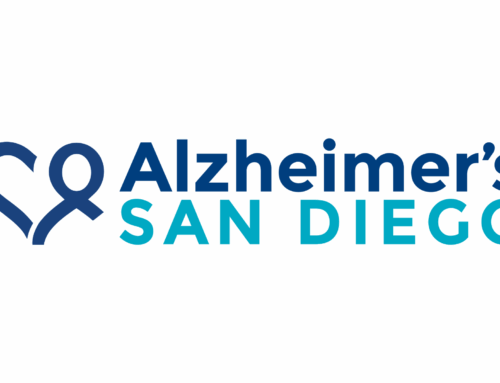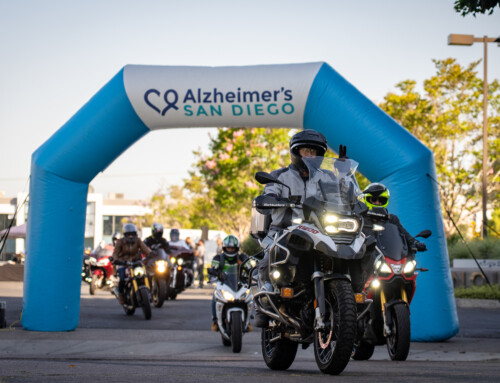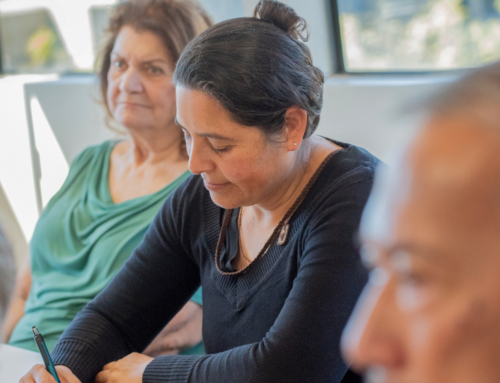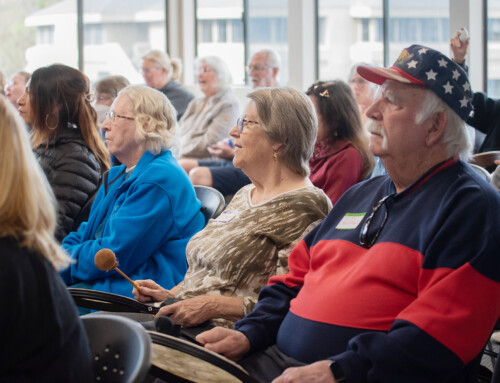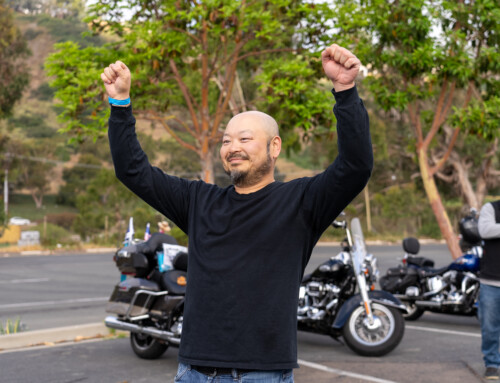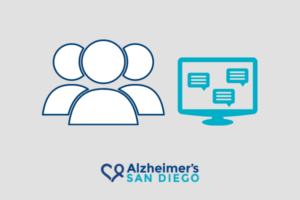 By Kara Jacobsen
By Kara Jacobsen
With the stress of COVID-19, the challenges of being a dementia care partner may even seem more difficult now. We know firsthand that many people are thinking: I feel so alone.
For longtime support & discussion group leaders Lynne Smith and Janet Hartshorne, these are familiar concerns. Both have years of experience caring for their own loved ones and now give back by leading virtual groups through Zoom.
“People need a place where they can come to share exactly what’s going on. How crushed they are, they can cry, they can laugh, they can pour out anything and everything that they’re feeling. We like to call it the safe zone,” Lynne describes.
Lynne manages the Santee, San Marcos, and Carlsbad groups. She lost both her parents to Alzheimer’s, as well as five other people very close to her. She has been volunteering as a group leader for 13 years.
Janet leads the Oceanside Senior Center group and this will be her third year volunteering. After having attended the same group herself before losing her husband in 2011, Janet realized recently it was her time to give back.
Keep reading our Q&A with Lynn and Janet to learn how our new virtual support groups have made a difference during the pandemic.
Q: What were your concerns with transitioning to online groups?
Lynne: The most challenging part was anticipating and navigating technical difficulties. We had to make sure families had the correct times on their calendars and were able to set up the correct hardware prior to the meeting times. I was concerned about the connectivity causing gaps in communication or families not being able to access the meetings with the correct links.
Janet: I had heard such negative things about Zoom being hacked.
Have technology questions? Contact our Volunteer Tech Team >>
Q: How did the sessions go compared to your initial concerns?
Lynne: Overall, it went a lot better than I thought. Virtual meetings have pros and cons. In-person, the group is able to get a break away from home and better experience emotions that may not come through as clear through the screen. But on the other hand, the virtual groups mean a lot less driving, it’s safer for both parties because of COVID-19, and they save you a lot of time.
Janet: They all jumped at the chance to meet online because they’ve been cut off. Caregivers are isolated enough. Initially, I was worried about the safety of it all, but we have a private account. Everything still stays confidential. It’s the same on Zoom as in the room, except we normally meet around a table. You can’t touch, hug, help someone if they’re crying so that personal touch is missing, but it functions pretty much the same.
Q: How has COVID-19 affected your support group?
Lynne: People are strict about their loved ones going out. I’d say about 30% are experiencing feelings of anxiety, and especially those who have someone in a memory care facility are worried their person with dementia won’t remember them.
NEW GROUP: Care Facility Care Partner Group
Janet: I think based on feedback, people are really appreciating being able to do this virtually. Can you imagine what this would have done to us without technology? It’s marvelous we’re able to show silly things we see on social media if someone’s having a bad day, which we could never do back in the day. I can picture how it would be without any outlet…it would have been diabolic.
Everyone seems to enjoy it, they thank me profusely. No two loved ones are at the same stage, but when they hear what’s going on they can remember that piece of advice for the future or help those who are currently going through what they’ve already experienced, it really helps.
Q: What piece of advice would you give to someone right now during this pandemic?
Lynne: Well that’s why we go to the liquor store (chuckles). No, in all seriousness I say that because we have to keep the humor somehow — it helps a lot.
Four things:
1) If you’re struggling, reach out and call the team of dementia experts at Alzheimer’s San Diego, there’s always someone there who’s going to understand what you’re going through. They need people to understand. Family and friends who don’t fully understand the disease, aren’t going to understand your struggles. Don’t do this alone.
2) Try to keep your person calm if you can through therapeutic fibbing. A lot of individuals might find this difficult because they are conflicted with feeling like they are lying to their person. But if you don’t practice this, it can make a bad situation much worse. Sometimes you have to do what you need to in order to diffuse a difficult situation.
READ MORE | Do’s and Don’ts of Communication and Dementia
3) Find community through a support group. They know dementia – talk to these people. The people who don’t understand aren’t going to give you the best advice.
4) The more you can learn about the disease, the better off you’re going to be. Whether it’s from the online handouts, educational classes, advice given in support groups, etc. Having those tools is going to help you in the long run with certain situations and overall will help you better cope emotionally.
Q: Why should someone consider joining a support group?
Lynne: People need a place where they can get out so much of their frustration, their struggles, and their heartbreak. When they come to a meeting they can share exactly what’s going on, how crushed they are, they can cry, they can laugh, they can pour out any of what they’re feeling. We like to call it “the safe zone”. You instantly form this bond with a group of strangers and leave knowing you’re not alone. You’ll learn tips on how to diffuse bad situations and figure out what daily activities work and don’t work for you.
Janet: Because simply put, it beats the alternative. These care partners have lost respite, driving them to places with lots of people like a restaurant or the beach. Now with limited restrictions, some of these things are available, but for safety purposes it’s risky. All these things have stopped for months now. It’s going for 24 hours with no relief. Even during ALZ Companion volunteer meetings or support group sessions, the care partner and person with dementia can still come in and out of the screen so it’s not always complete respite. Ultimately though, these groups help relieve the isolation COVID-19 has brought. A UCSD Caregiver study showed that stress levels affect every organ in the body. During these meetings, your stress levels are reduced.
Q: What was the most valuable thing being a support group leader has taught you?
Lynne: I’ve learned so much from caregivers. Being a support group leader, they’ve taught me how to be a better person. They’ve shown me love and patience. Patience in a way that you find yourself wanting to listen, taking time to slow down and listen to what people are saying. It has opened my eyes. When you’re caregiving, you’re in that moment with your person living with dementia and the world seems to pass you by. But when you listen to all the stories people share, there’s so much more you realize…what you thought was only going on behind closed doors in your house, you find out is happening to others too. You learn just how many more people are overloaded. It taught me to take time to listen and to care enough to find out how I can help…and what a difference I could make in someone’s world. Someone in my San Marcos group shared “Alzheimer’s has made me a better person.” Of course, everyone’s initial response was like wait…what? But it is true. Emotionally being able to handle these challenges that cut to the depth of your soul is life-changing.
Join a support group today or learn more by calling Alzheimer’s San Diego at 858.492.4400. We’re here to help!
